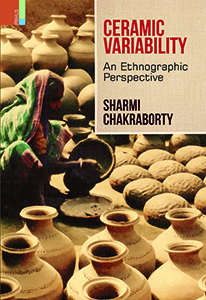
Ceramic Variability: An Ethnographic Perspective
AUTHOR- Sharmi Chakraborty
| HB ₹995 . $49.95 . ₤36.95 |
||
INFORMATION
- AUTHOR : Sharmi Chakraborty
- HB ISBN : 978-93-86552-77-8
- POD ISBN : 978-93-86552-78-5
- EBOOK ISBN : 97893-5290-266-8
- HB Year : 2018, POD Year: 2018, EBOOK Year: 2019
- Extent : 216
- Discount available on checkout
- Usually dispatched within 3 to 5 working days.
Ceramic Variability
| HB ₹ 995 . $ . ₤ |
PB ₹ . $ . ₤ |
|
| POD ₹ . $ . ₤ |
e-Book ₹ . $ . ₤ |
INFORMATION
- AUTHOR – Sharmi Chakraborty
- ISBN – 978-93-86552-77-8
- Year – 2018
- Extent: 400 + 40 coloured illustrations
- 10% discount + free shipping
- Usually dispatched within 3 to 5 working days.
Variations in ceramics are culturally significant. These are an expression of the functions that they are meant to perform, the identity of a community and a reflection of time. It is therefore of great interest to archaeologists and anthropologists.
Ceramic Variability is based on a survey of villages in different parts of West Bengal to see ceramic variability that is noticed these days within a linguistically similar community occupying different regions. The research work attempts to locate the nature of variations within regions and analyse its causes. It examines how form is related to function, how variations are related to technique of production and how variations are associated with local conditions, both natural and cultural.
This volume ultimately aims at developing a conceptual framework for analysing archaeological ceramic. In the appendix section it attempts to classify the pottery rims from a technical aspect which the author feels would be culturally more relevant than a simple morphological aspect. Further, the book also tries to draw attention to the contribution of women potters to the pottery-making tradition of India.
The Author
Sharmi Chakraborty is Fellow, Centre for Archaeological Studies and Training, Kolkata.
Variations in ceramics are culturally significant. These are an expression of the functions that they are meant to perform, the identity of a community and a reflection of time. It is therefore of great interest to archaeologists and anthropologists.
Ceramic Variability is based on a survey of villages in different parts of West Bengal to see ceramic variability that is noticed these days within a linguistically similar community occupying different regions. The research work attempts to locate the nature of variations within regions and analyse its causes. It examines how form is related to function, how variations are related to technique of production and how variations are associated with local conditions, both natural and cultural.
This volume ultimately aims at developing a conceptual framework for analysing archaeological ceramic. In the appendix section it attempts to classify the pottery rims from a technical aspect which the author feels would be culturally more relevant than a simple morphological aspect. Further, the book also tries to draw attention to the contribution of women potters to the pottery-making tradition of India.
The Author
Sharmi Chakraborty is Fellow, Centre for Archaeological Studies and Training, Kolkata.
Table of Contents
Table of Contents
| List Of Tables | Vii |
| List Of Figures And Map | Ix-Xiii |
| List Of Plates | Xv-Xvii |
| Acknowledgements | Xix |
| Introduction | 1-9 |
| The Survey | 10-28 |
| Morphometry And Formal Variation | 29-70 |
| Pots From The Local Market | 71-92 |
| Manufacturing Process | 93-130 |
| Conclusion | 131-138 |
| Appendix I: Classification Of Excavated Pottery | 139-174 |
| Appendix Ii: Handmade Pots: Women In Potter’s Household | 175-180 |
| Bibliography | 181-185 |
| Glossary | 187-189 |
| Index | 191-196 |




